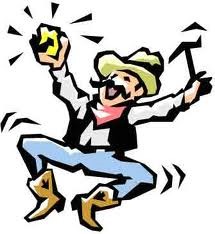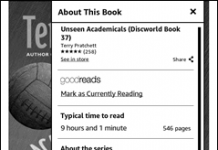 Here’s a story that’s been getting some play over the last couple of days. There’s a piece on The Hustler from a fellow named Sidd Finch who reportedly makes $150,000 a year by gaming the system on Amazon as a “Kindle Gold Rusher”. (Found via The Passive Voice.)
Here’s a story that’s been getting some play over the last couple of days. There’s a piece on The Hustler from a fellow named Sidd Finch who reportedly makes $150,000 a year by gaming the system on Amazon as a “Kindle Gold Rusher”. (Found via The Passive Voice.)
He started out by looking at bestselling titles on Amazon, figuring he could do better, and then studying the existing bestsellers and writing a book of his own along the same theme. From there, he branched out into writing outlines and then paying ghost-writers to complete them for him, and paying other people for reviews to make his books look better. Sheesh.
It’s an interesting strategy. The funny thing about it is how much it resembles some of the content-mills from a few years back, before Kindles were the big thing and everyone was having to sell e-books on their own. Indeed, a popular scam back in the day was to write collections of short non-fiction e-book articles on subjects like how to beat speeding tickets and then sell the collections for other people to make money republishing as “their own” content. (Generally, the only person who ended up making the money was the person who sold the rights to someone else.) Now here we have someone doing something similar, a bit more successfully.
Nate Hoffelder compares it to a latter-day Stratemeyer Syndicate, the company responsible for many of the famous juvenile adventure series of bygone years—The Hardy Boys, Nancy Drew, Tom Swift, etc. A lot of commenters reflect that the recent changes in Kindle Unlimited’s lending rates might lead to a (well-deserved, in their opinion) cut in pay for the guy.
But I’m starting to wonder now. With Kindle Unlimited, we effectively have a new kind of network full of people who can read whatever they want to for free, but their reading for free pays something to the people who wrote it. Maybe it pays less now than it did before the rate change, I don’t know. It pays differently, anyway—but it still pays something. (And then there are the old-fashioned readers who will pay a few bucks for ownership.)
For years, I’ve written stories and posted them free to the Internet, just because it was a place to get some readers and a way to be a part of a community. But my recent experience self-publishing my Indianapolis guide has shown me that self-publishing via Amazon is almost as simple as posting to the Internet. I just need to come up with some cover art, then I can upload the story, and any KU subscriber can read it for free.
And I look at that market and wonder what’s keeping me from trying that? Maybe I should. I won’t make any $150,000 per year, but I should at least be able to make something. Especially if I can get my existing readers to read me there.
Maybe I should sit down one day and give it a shot.
































Chris, I might be wrong, but.
This entire story is a lie and a hoax. This 26 year guy wrote this entire as a hoax, read the words and unfactchecked boasts he uses, “I made 150k a year” …..PR people and telemarketers all say that in promo material. Find out who he is: his real name — this story never happened. Once again, the internet did not factcheck this story and ran it as is. No editing, no vetting. Caveat emptor, reader beware. It’s pure BS entertainment.
And here is why is it so evident: Even Hustle editors note at end of his “piece” — which was really written and published by an insider there to promote and hype the FIRST issue of their site, get it? — even the eds admit “if this story turns out not to be true, we will alert readers next week, Please sign up HERE to get our newsletters free of charge.”
This article never should have been published in Telereade as is, other than as a cautionary tale of what NOT to believe on the internet, especially with a newbie site looking for eyeballs and traffic. and yes, this fake hoax piece worked: even Teleread fell for it. And over 10,000 sites and platforms and Twitter feeds when with this crapola. don’t people read between the lines anymore? Or is everyone so hungry for easy money that they will fall for anything that promises gold at the end of the rainblow. yes, rainblow. this is all blow. Not one word of truth or fact in this piece this author, not his real name, is not a real person. Great writing and it worked as marketing. But. come on, doesn’t anybody else see through this?
”Confessions” from the Underground World of Kindle eBooks, Part 1
This guy ”games” Amazon and makes ”$150k” a year off ”selling” ghostwritten ebooks. Here’s ”exactly” how he does it.
BY Sidd Finch
NOTE FROM HUSTLE EDITORS:
A note from The Hustle
To “prove” whether this anonymous’s author word is “legit,” we spent the last week gaming Amazon and trying to become a bestseller in one week. We’ll reveal the results on Monday, along with why this is a big problem that you should actually give a shit about.
We’ll reveal the results on Monday. Enter ye ole email in the box below to be notified when we post the results.
And if you have a story we should cover, tell us [here.]
Thoughts?
BEST comment so far at hustle site:
Tim Castleman ·
Wayland Baptist University
Sam Parr hey man …….I’m a friend of Steve and honeslty I don’t want his name associated with this at all. Steve writes his own books, 100% of them and he doesn’t outsource anything but the design of his books.
I make 4 figures a month on kindle with my self published books that I’ve personally written, had edited, etc.
Not everyone is out to con the system like this guy
Another commenter notes: ”It’s about 95% believable. Just the like the famous April Fool’s Day article George Plimpton wrote for Sports Illustrated about the nearly super human pitcher Sidd Finch.”
That might be the case, but given that the story was also carried by The Passive Voice and The Digital Reader, if it’s a hoax, I’m in pretty good company.
It does at least make a great conversation starter. It’s similar enough to some of the get-rich-quick schemes of the past, and the way the Stratemeyer Syndicate made its money, that it is plausible. But you’re right, it is starting to look a little dubious.
That said, it doesn’t seem like the kind of thing you could prove or disprove in a single week.
Thanks for your comments, Dan. Chris has a good track record, and he did use the word “reportedly.” That said, I’m sure he’ll be as interested as I am in how this shakes out.
I will say that if anyone claims the existence of a hoax-proof publication, that statement in itself will be a hoax of sorts. Look at the Washington Post and Janet Cooke. Look at the NYT and “weapons of mass destruction.” Needless to say, people in Washington can be among the biggest hoaxers. Methinks that U.S. election returns would be a lot different if the mainstream national press weren’t so gullible. Some years back, Cracked published a fun piece called 7 Clearly Fake News Stories That Fooled The Mainstream Media.
Of course, TeleRead is better than the mainstream, in that we have The Rail—the sidebar on the right where readers can challenge anything that Chris or I or anyone else writes (no one’s infallible). Keep the comments coming. The value of the site is not just in the posts but in the insights of the TeleRead community members. Shame on certain publications for recently playing down reader comments. Lazy and arrogant journalism! Rather than downplaying comments, these publications should be better presenting and curating them.
Meanwhile, though hardly perfect, we’ll do our best, especially when the “information” source is a publication with a name like “The Hustler.” Oh, well. I guess the labeling is more helpful than in the case of The Onion.
David
I thought this was real when I read it. I still do.
His numbers don’t add up. His claimed sales numbers don’t match his claimed yearly income. Not even close.
Sidd Finch is a fictional baseball player created by (I think) Sports Illustrated in the 1980s as part of a really well done April Fools Day joke. He was a pitcher who could throw in the 120s or something.
Chris and David, I wasn’t criticizing Chris nor was I knocking Teleread for running the piece. I was….just sayin’…..
As Greg in comments also notes: ”Sidd Finch” — the hoaxer’s pen name for The Hustle — was a fictional baseball player created by (I think) Sports Illustrated in the 1980s as part of a really well done April Fools Day joke. He was a pitcher who could throw in the 120s or something.”
I am not blaming anyone or criticizing anyone for not seeing the hoax. It was a very well written and played hoax and many other publications picked it on it. And thousands of bloggers said wow, gee whiz. So it must be true. Not.
Hey, Dan, actually you were criticizing us—and you were right. No safety in numbers here. Use of a story elsewhere is no guarantee of accuracy.
Among the other big lessons in this case? Pay attention to The Hustle’s name, and also Google up oddities like “Sidd Finch.” Plus, do The Numbers to see if they make sense. Even with precautions, no one is hoax proof. All we can do, as noted, is to try.
Speaking of hoaxes, the novelist Upton Sinclair fooled the press with The Journal of Arthur Stirling, supposedly by a young poet who killed himself because his works would not sell. Result was that Sinclair made some enemies for life. At least, unlike The Hustle, his books had redeeming social qualities, and he went on to write a valuable expose of the media called The Brass Check. I recommend it highly. You can read it for free via Google Books.
David
Well for the curious, no link, but hedline here:
Part 2: Confessions from the Scammy, Underground World of Kindle eBooks
I gamed Amazon, plagiarized another author, and became a #1 ranked, bestselling romance novelist author in one week. I disgust myself.
by John Havel